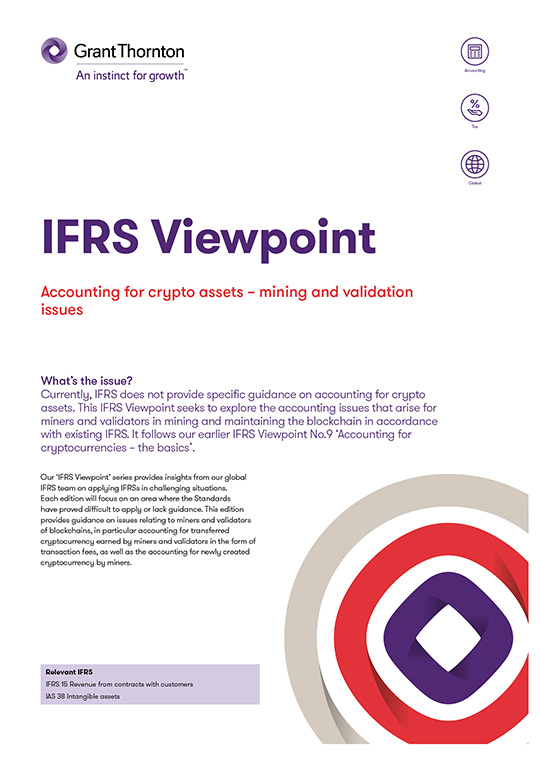What’s the issue?
Currently, IFRS does not provide specific guidance on accounting for crypto assets. This IFRS Viewpoint seeks to explore the accounting issues that arise for miners and validators in mining and maintaining the blockchain in accordance with existing IFRS. It follows our earlier IFRS Viewpoint No.9 ‘Accounting for cryptocurrencies – the basics’.
Determining the appropriate accounting treatment
With the current lack of clear guidance, there is likely to be a large amount of diversity in practice as to what alternative accounting treatments may be acceptable for crypto assets and in particular cryptocurrencies. Furthermore, as the use of blockchain technology evolves, more specific guidance is issued, and more standardised industry practice is established there may be changes in the current thinking around acceptable accounting treatments.
A four-step process
Until further specific guidance is issued it’s necessary to obtain a detailed understanding of the particular type of cryptocurrency and use of blockchain being considered. Therefore, we recommend following a framework to determine the most appropriate accounting treatment. The framework should consist of the following steps:
Step 1 – Understand the blockchain environment the entity is operating in
Step 2 – Understand how the entity operates (solo or in a pool)
Step 3 – Understand the rights associated with the particular cryptocurrency (or crypto asset)
Step 4 – Apply existing IFRSs to the specific facts and circumstances based on the understanding obtained above.
Alternative view
Some commentators argue that the mining of cryptocurrency represents the creation of an internally generated intangible asset. Accordingly, the requirements of IAS 38.57 need to be considered. The miner is inputting computing power, electricity and staff cost to build, or mine, an internally generated intangible asset, being the cryptocurrency. Therefore, no revenue or gain is recognised until the resulting cryptocurrency is subsequently sold.
While our preferred views are discussed in this Viewpoint, if a view is taken that no revenue or other income can be recognised and the transaction is considered to be development of an intangible asset, we do not consider that the requirements of IAS 38.57(f) will be met. IAS 38.57(f) requires that the cost attributable to the development of the intangible asset can be reliably measured.
The nature of competing against other miners to create the next block will result in it being difficult to specifically identify the cost incurred to create the block reward separately from the cost incurred on all previous unsuccessful attempts to create the next block, meaning that this criterion is not met.
Therefore, all costs associated with mining must be expensed as incurred and no revenue or gain is recognised until the resulting cryptocurrency is subsequently sold.
Looking forward
The world of cryptocurrencies, and more importantly the growth in the number of applications of the underlying blockchain technology, is evolving fast. This results in it being difficult to create a standardised taxonomy for crypto assets. In addition, with the current lack of clear guidance, there is likely to be a significant diversity in practice as to what alternative accounting treatments may be acceptable.
Therefore, while this viewpoint provides guidance on the general accounting considerations relating to the cryptocurrency mining industry, each specific situation should be assessed based on its own underlying facts and circumstances. Furthermore, as the use of blockchain technology evolves, more specific guidance is issued, and more standardised industry practice is established, there may be changes in the current thinking around acceptable accounting treatments. It is highly advisable then that consultation with your Grant Thornton advisor is sought in all situations.
If you would like to discuss any of the areas highlighted in this Viewpoint please speak to your usual Grant Thornton advisor, your local member firm or one of our global IFRS contacts.

